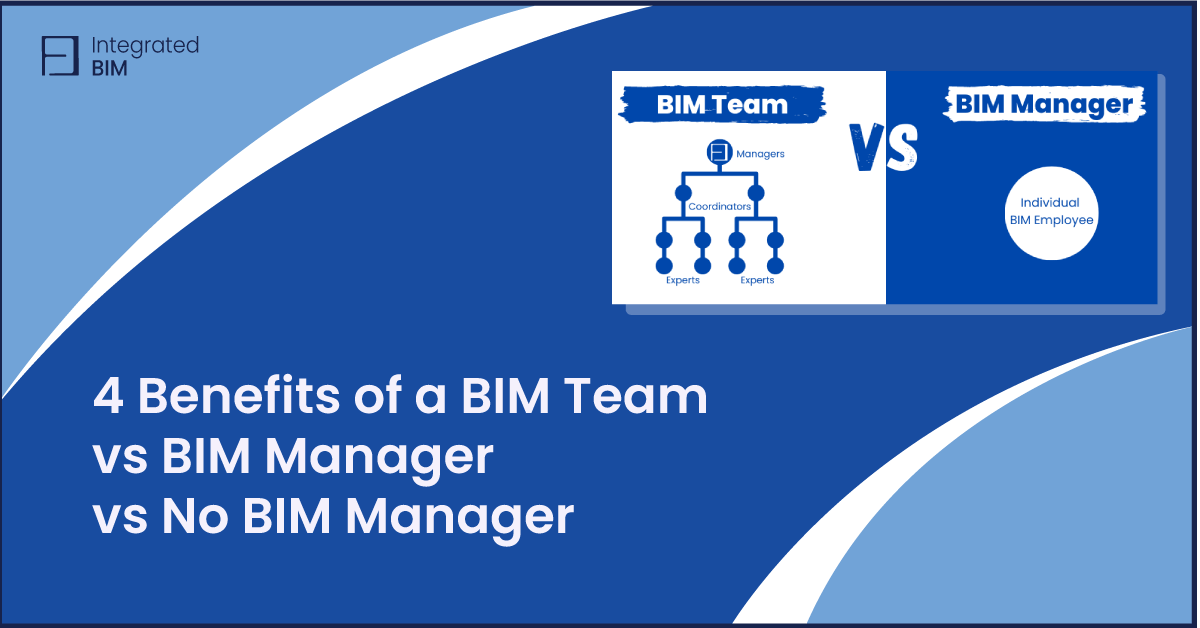In today’s fast-paced architectural industry, the implementation of Building Information Modeling (BIM) has become increasingly essential for successful project delivery. However, the presence of a competent BIM Manager can significantly impact the efficiency, productivity, and overall success of your team. In this blog post, we will explore the value that a BIM Manager can deliver and compare the outcomes of having no BIM Manager, a BIM Manager, and a dedicated BIM Team.
No BIM Manager
When there is no BIM Manager in place, you are relinquishing control over your team’s systems and workflows. Without software optimization and maximum productivity practices, you may be leaving valuable opportunities on the table. As a result, you may find yourself struggling to keep up with project demands until it becomes overwhelming and unmanageable.
BIM Manager
Having a BIM Manager can certainly improve your team’s systems, workflows, and software optimizations. However, the effectiveness of a BIM Manager largely depends on their expertise and capabilities. If the person is a highly skilled and experienced top expert in the field, they can efficiently drive improvements and enhance overall productivity. It’s paramount to emphasize that a proficient BIM Manager can become a catalyst for transformative advancements within your projects and operations.
Nonetheless, there are critical considerations to keep in mind. Relying solely on a BIM Manager, even one with significant expertise, presents potential limitations. The risk associated with placing the entire burden on one individual is significant, as their departure or inability to deliver can lead to substantial repercussions. Moreover, the challenges of staying abreast of the swiftly evolving industry trends and best practices can be time-consuming.
It’s crucial to recognize that an insufficiently capable BIM Manager, despite the best intentions, can inadvertently cause more harm than benefit to the company’s growth and innovation. The role demands not only proficiency but also continuous dedication to mastering the latest tools and strategies in the dynamic BIM landscape. For an in-depth exploration of this pivotal role, read more about “The Power of the Top Expert: How Your BIM Manager Impacts Your Business Success.”
BIM Team
The true power lies in having an experienced and value-driven BIM Team. The BIM Team consists of professionals who work collaboratively and have extensive experience working with various companies. This diverse exposure allows them to test different systems, workflows, and best practices, enabling them to identify what works best for your specific projects. By working with multiple expert teams, they stay at the forefront of industry trends, ensuring they can provide the best potential solutions at all times.
Moreover, the BIM Team operates as a versatile asset for architectural organizations, accommodating diverse BIM management structures.
When a Company Has a BIM Manager
In cases where a company employs a BIM Manager, the BIM Team seamlessly supports the organization by adeptly handling technical aspects. This proactive approach frees up the BIM Manager’s time, allowing them to focus on pivotal management-related tasks. These tasks encompass strategic planning, orchestrating project coordination, leading teams, and aligning BIM strategies with the broader company goals. With the technical intricacies managed by the BIM Team, the BIM Manager becomes a strategic orchestrator of resources, fostering innovation and efficient progress.
When There Is No Dedicated BIM Manager, but There Is a BIM Team
For architectural organizations operating without a dedicated BIM Manager, the BIM Team assumes an even more pivotal role. In this scenario, the BIM Team steps in to fill the void, acting as the central point of contact. This strategic approach turns each architect and designer from administrative loads, allowing them to focus on their core creative tasks, ultimately nurturing innovation.
In both scenarios, the BIM Team emerges as an indispensable driving force. By optimizing resources, elevating productivity, and synergizing efforts, the BIM Team empowers the architectural company to strive toward achieving its overarching goals. In collaboration with the BIM Manager or as the key point of contact, the BIM Team harnesses the potential of BIM, laying the foundation for sustainable growth and fostering a culture of innovation.
Benefits of a BIM Team
1. The BIM Team Holds Wide-ranging Experience
A BIM Team’s collective experience spans across different projects and companies. This wealth of knowledge enables them to bring a diverse perspective and implement tried-and-tested strategies for maximum efficiency.
2. Concentrates on Continuous Learning
With multiple teams, a BIM Team can quickly adapt to industry advancements and emerging technologies. They stay updated with the latest trends, saving your team the time and effort of figuring out what is happening in the industry.
3. Ensuring Best Practices Implementation
Working with various companies exposes the BIM Team to different workflows, enabling them to identify and apply the most effective practices. This ensures that your team benefits from the industry’s best practices, resulting in enhanced productivity and streamlined processes.
4. The Team Provides Reliable Support
A BIM Team offers a dependable support system for your team, mitigating the risk associated with relying solely on an individual. With a team approach, continuity is maintained even if a team member leaves, minimizing disruption to your projects.
It’s important to acknowledge that not every BIM Team is automatically great or reliable. Just as with any crucial business decision, a thorough evaluation is essential to ensure you’re partnering with a team that aligns with your goals and expectations.
Read our article for an in-depth guide on how to choose the best BIM Team / BIM Consulting Company for your projects, including key factors to consider and questions to ask.
While having no BIM Manager can hinder your team’s progress, relying solely on a BIM Manager poses its own set of challenges. However, the ultimate value lies in investing in a dedicated and experienced BIM Team. With their extensive experience, continuous learning, and ability to implement best practices, a BIM Team can unlock the full potential of BIM within your projects. By partnering with a BIM Team, you can maximize efficiency, and productivity, and ultimately achieve greater success in your endeavors.
Ready to experience the value of a BIM Team? Contact us today to book a free consultation and discover how our expertise can benefit your architectural projects.










